The Jews in Stalin’s secret police, and where to lay blame for pogroms that killed thousands, are among topics up for discussion in academies from New York to Ukraine
By JULIE MASIS, TOI
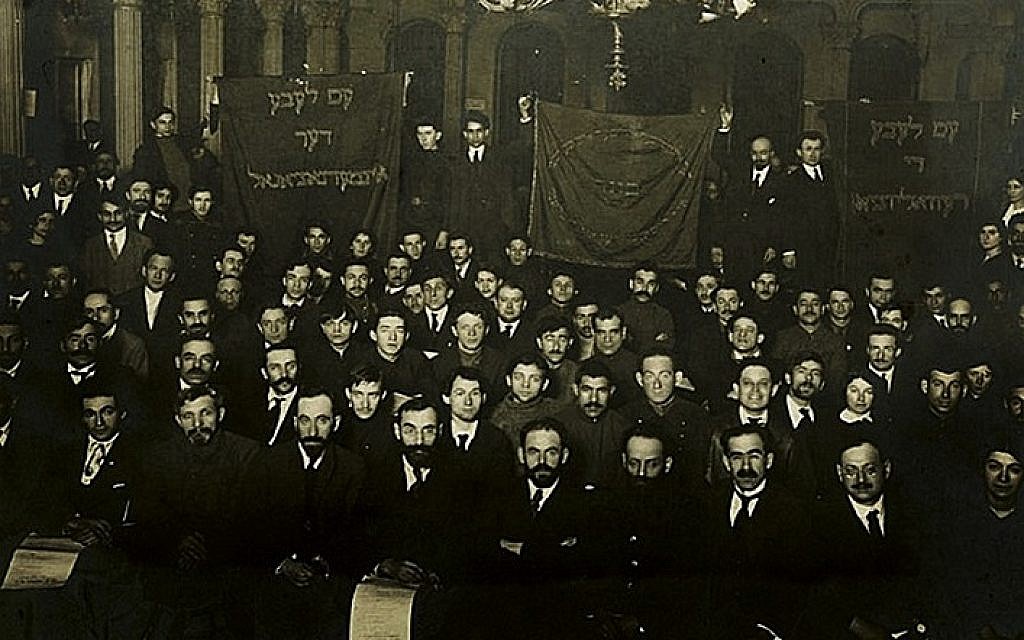
A Jewish political gathering in Russia around the time of the Russian Revolution. (Courtesy Jewish Museum and Tolerance Center in Moscow)
It is now 100 years since the revolution that brought down the Russian Tsar Nicholas II.
For Jews, the fall of Tsarist Russia meant a new relative freedom: the end to the Pale of Settlement, which had prevented Jews from living in big cities, and the abolition of all other anti-Semitic laws, such as quotas for Jewish children in primary schools and discriminatory military service requirements. Soviet Russia also became the first country in the world to declare anti-Semitism a criminal offense.
To commemorate the centennial of the revolution, academic conferences around the world are discussing the role Jews played in the uprising and its aftermath — and how they were affected by it.
Here’s a look at some of the events.
Ukraine
Were Ukrainian nationalist leaders responsible for the pogroms that caused the deaths of tens of thousands of Jews during the Russian civil war? This and other subjects were discussed at a October 15 conference in Kiev.
The conference, entitled “Ukrainian Jews: Revolution and Post-Revolutionary Modernization” brought together scholars from Russia, Israel, the United States, Ukraine, Hungary, and western Europe for presentations on topics ranging from the Jewish Communist Party (Poalei Zion) to images of synagogues in revolutionary art.
One of the central topics was whether the leaders of Ukraine, which declared itself independent from Soviet Russia between 1917 and 1921, were responsible for the pogroms that lead to the deaths of between 50,000 and 200,000 Jews – the greatest calamity to befall the Jewish people prior to the Holocaust.
Speaking with The Times of Israel, Vitaly Chernoivanenko, the president of the Ukrainian Association for Jewish Studies and one of the organizers of the conference, said that Ukrainian leader Symon Petliura cannot be held responsible for the pogroms.
“Petliura himself didn’t support the pogroms, but he couldn’t control the situation,” said Chernoivanenko. “Petliura didn’t control the entire territory. I think he would have protected the Jews.”
He also said the Jews were not the only victims of the pogroms.
“These pogroms were not directed at the Jews. Some people just wanted to plunder and loot. Just as Jews were looted, others were also looted,” he said.
But outside of Ukraine, historians disagree with this point of view.
In a phone call, Gennady Estraikh, a Jewish history professor at New York University, called this universalist approach to pogrom victims historical revisionism.
“As a leader, he didn’t stop the pogroms, and in that way Petliura was responsible — just like Hitler is responsible for the Holocaust,” Estraikh said. “A military leader is always responsible for what their soldiers do.”
Estraikh gives for example the town of Berdychiv. In 1919, a military unit was sent by Petliura to fight the Bolsheviks, but organized an anti-Jewish pogrom instead. Later, this unit went on to organize an even larger pogrom in Zhytomyr, Estraikh said.
“They were killing unarmed civilians, elderly people, women and children,” he said.
Petliura was de facto proven guilty in a French court in the 1920s, after he was assassinated by a Jewish man whose parents had been murdered in a pogrom.
The assassin, an anarchist named Sholom Schwartzbard, was reported in French newspapers at the time as bragging about the killing during his trial.
As recorded in Time, Schwartzbard told the court, “When I saw him fall I knew he had received five bullets. Then I emptied my revolver. The crowd had scattered. A policeman came up quietly and said: ‘Is that enough?’ I answered: ‘Yes.’ He said: ‘Then give me your revolver.’ I gave him the revolver, saying, ‘I have killed a great assassin.’”
“When the policeman told me Petliura was dead I could not hide my joy. I leaped forward and threw my arms about his neck,” Schwartzbard said.

Despite his open admission, the court still acquitted Schwartzbard, and “that’s how Petliura’s guilt was admitted,” said Estraikh.
When asked to comment on whether non-Jews were also the victims of Ukrainian pogroms, Estraikh said the Ukrainian historian should present some statistics to back up his point.
“This is not a critical approach to history. It’s an apologetic attitude. They don’t separate politics from history,” Estraikh said.
According to Estraikh, the Bolshevik Red Army was the only force that fought against pogroms during the Russian civil war, and on some occasions executed those who organized the pogroms.
“That’s why the Jews began to support the Red Army,” he said.
United States
In New York City, a conference organized by the YIVO Institute for Jewish Research will focus on the participation of Jews in the Communist Party and Stalin’s government.
The conference, entitled “Jews In and After the 1917 Russian Revolution,” will include presentations on such controversial subjects as Jews in Stalin’s secret police and Jewish communist spies in America during the Cold War. The conference is set to take place on November 5 and 6.
Jonathan Brent, the executive director of the YIVO Institute, says that it is important to discuss these subjects even if they make people uncomfortable.
“A lot of people do not realize that there were Jews in Stalin’s secret police,” Brent said. “This is something that really needs to be talked about. Some of these individuals had fathers who were rabbis in the shtetls.”
NKVD chief Genrikh Yagoda was Jewish, Brent says, and the first minister of justice in Soviet Russia, Isaac Steinberg, was a religious Jew. And, according to Brent, the instrumental person in the arrest of renowned Jewish author Isaac Babel was also Jewish.
“Everybody [in Stalin’s Russia] was a victim and a victimizer,” he said. “This is a hard thing for the Jews to understand. They can’t stand the idea of being more than innocent victims.”

In America during the Cold War, there were so many Jewish members in the Communist Party that it was difficult to find someone to serve as party leader who wasn’t Jewish, says Brent. He also says that the entire underground espionage network in the USA “was heavily Jewish.”
Asked if speaking about this might provoke an anti-Semitic reaction, Brent replied, “I don’t care. The anti-Semites are everywhere. Let them come out and talk to their hearts’ content. I’m interested in the truth.”
Russia
The Jewish Museum and Tolerance Center in Moscow is planning special exhibitions and events to mark the 100th anniversary of the revolution.
The exhibit, “Freedom for All? The History of One People in the Years of Revolution,” which opened on October 17, features documents from Jewish political parties during the time of the revolution and the writings of Jewish revolutionaries and artists such as Leon Trotsky, Yuliy Martov, Mar? Chagall, and Vera Inber.
There is also an art exhibit of the works of Jewish revolutionary-era artists, a series of lectures, and even a festive concert with Jewish revolutionary songs and poems performed in Yiddish.
“The anniversary of the revolution is an excuse to talk about what we never talked about before. November 7 was always a huge celebration in the USSR, but the Jewish aspects were never discussed,” said Boruch Gorin, the chairman of the museum’s board of trustees. “Now using new facts and new research we can talk about it for the first time.”

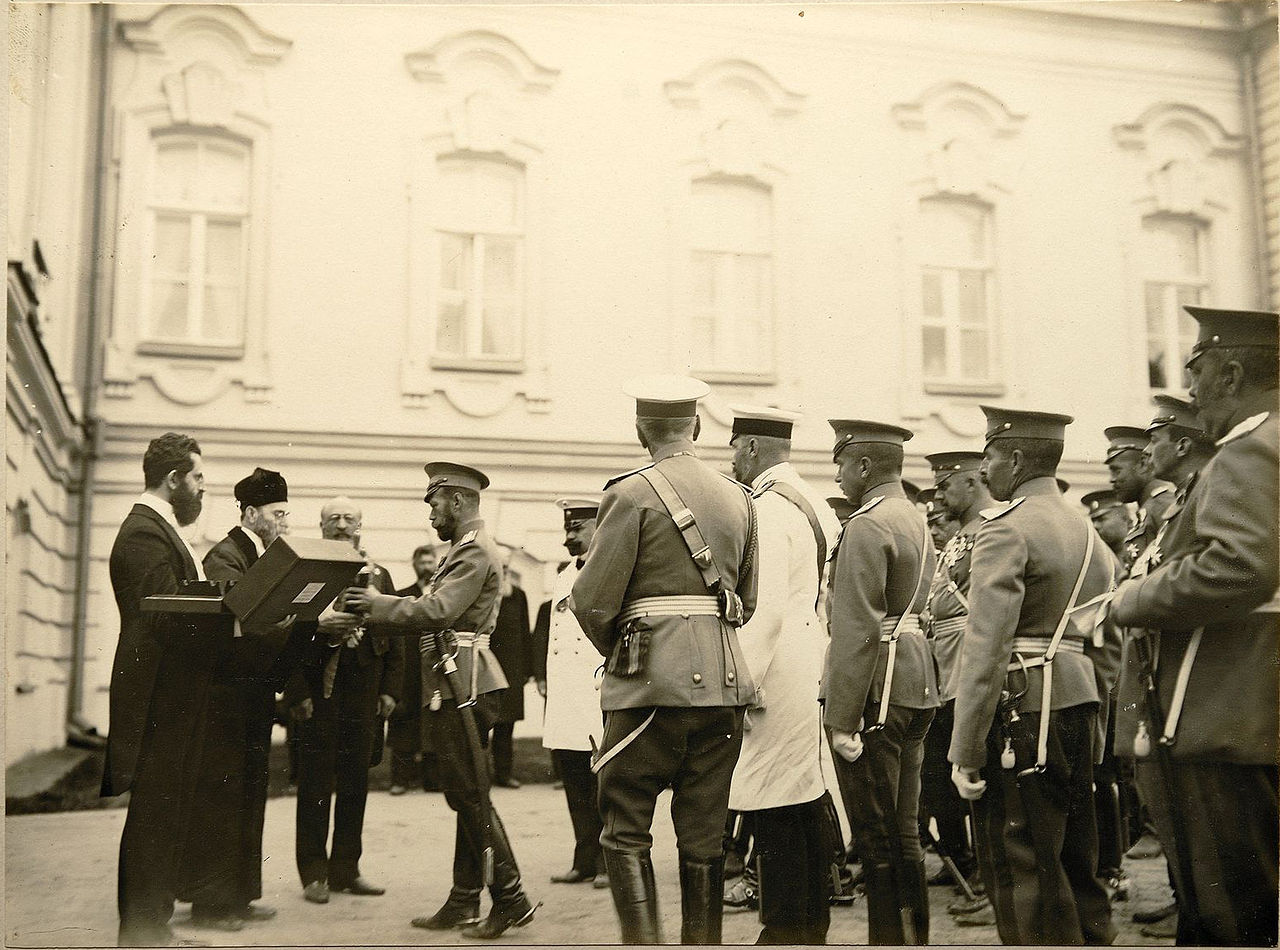
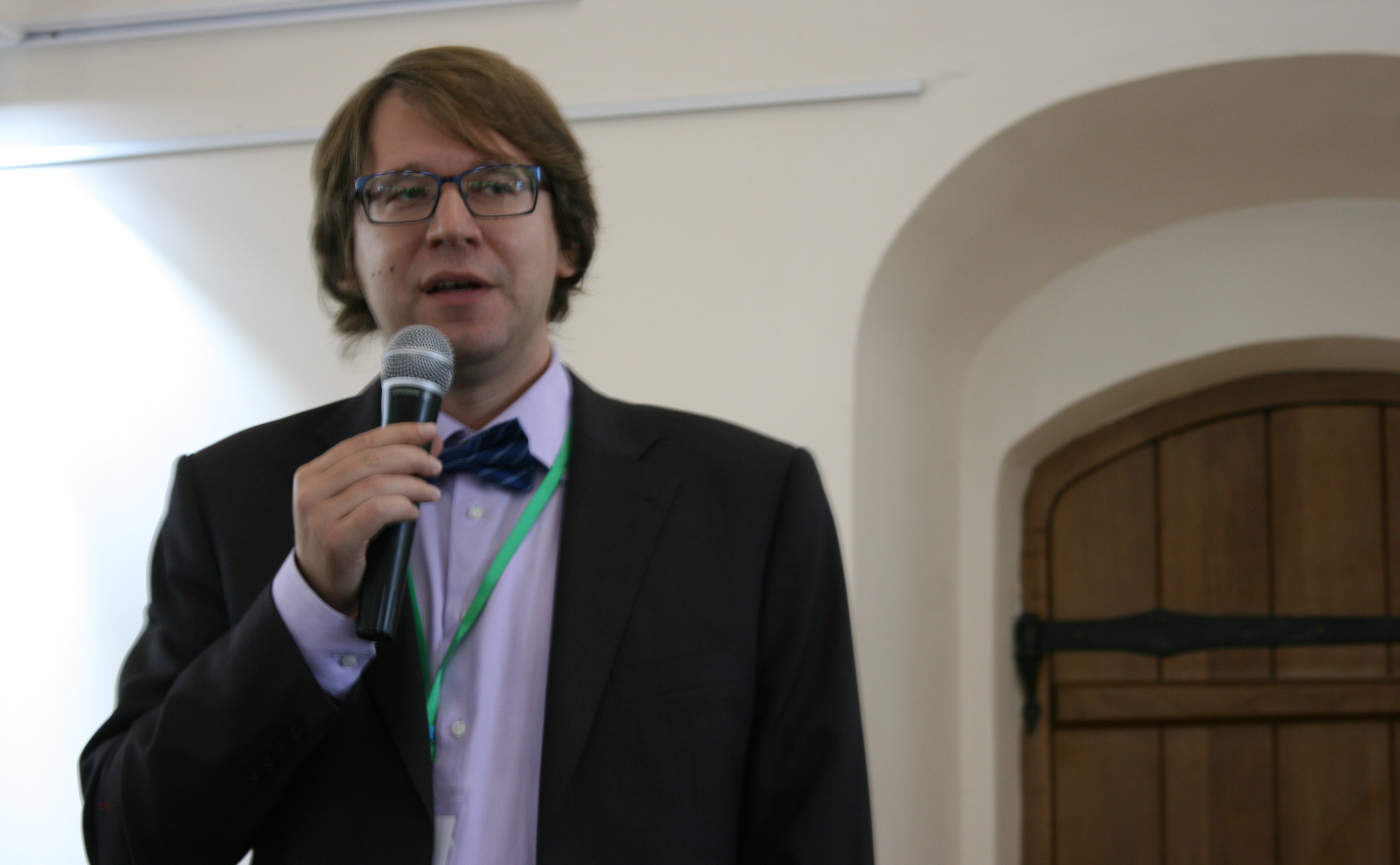
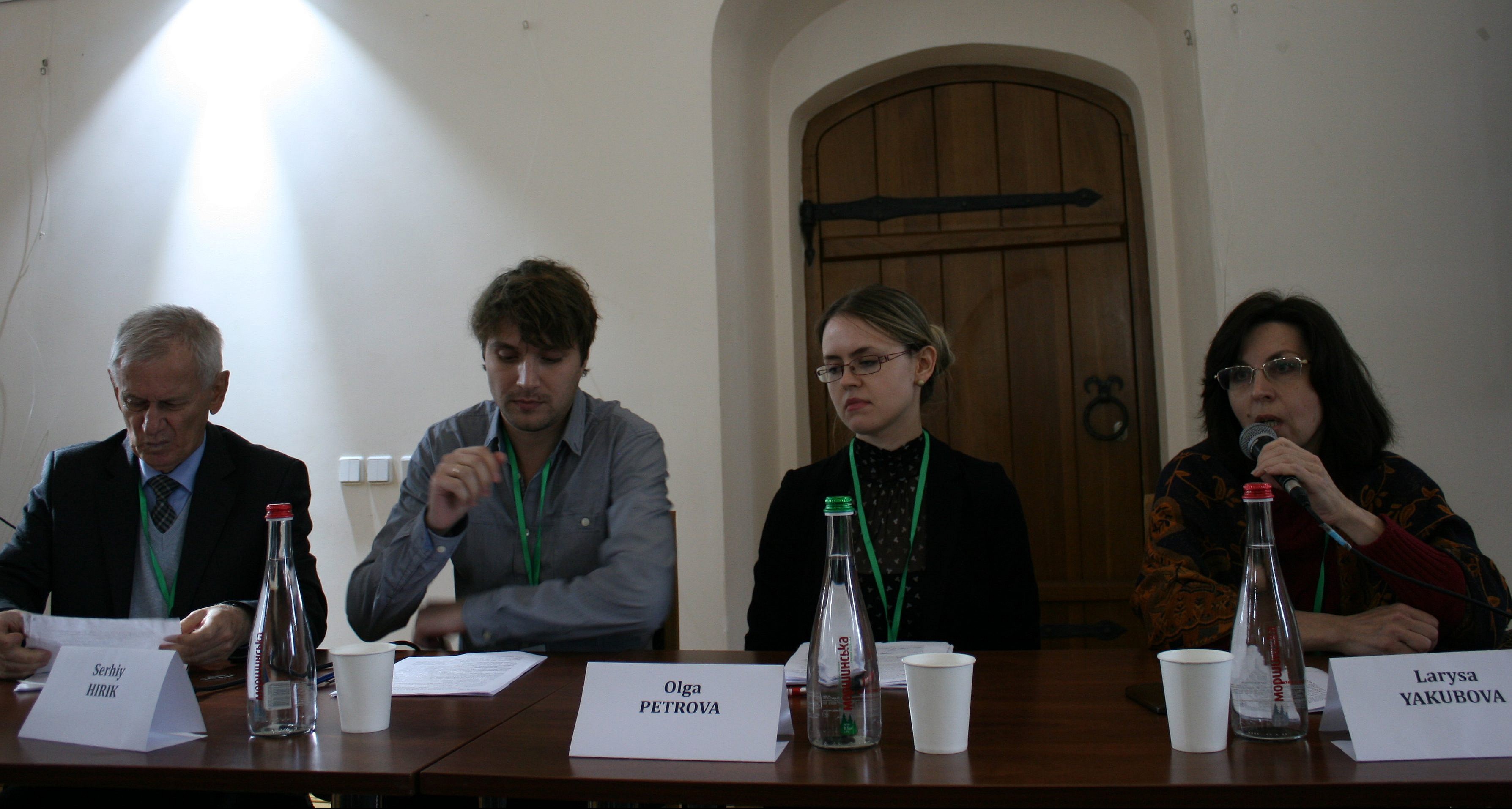
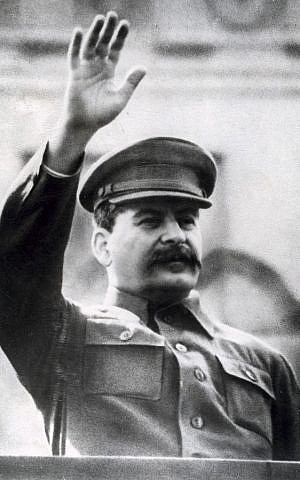


It was disapointing to me that the Conference on Jordan as reported on this link http://www.jewishpress.com/blogs/israpundit/a-review-of-the-jordan-option-conference/2017/10/18/ did not seem to discuss in any way the issue of Catalonia which is the most topical and central of all. If you ignore such issues how can you as Zionists expand your position in the world?
I do not know what point Brent is making here. Is he making the point that a commie hater like McCarthy would make, and at the same time engaging in antisemitism.
What if all the Jews were in the communist party in the 1930s. The point is that they were thereby in the party of Stalinism.
And does anybody on this site Israpundit have any idea what was Stalinism?
I know when I listen to Alex Jones and others on his Infowars team they have very little idea, maybe even no idea of that history.
And Jones may even be deliberately keeping the knowledge in that history hidden.
Jones is a communist and Marxist hater and he shares that with Hitler and Mein Kamph but Jones is not a Fascist.
I was finding it difficult to pin down the position of Jonathan Brent on anything. This is always a very bad sign.
Entering his name and Trump in google it becomes clearer. Brent is a reactionary of the deepest hue. He was part of this horrible academic lot who hated the election of Trump.
Now Alex Jones is a supporter of McCarthy. For that I call him a “scum bag”.
But yet I follow Jones for his opposition to the deep state of Bush and Obama with the Clintons. Roger Stone is a breath of fresh air.
Where is Brent? On the opposite side with the enemy and with the enemy of the Jews too!
Jonathan Brent, YIVO Institute, Center for Jewish History
as in
http://jewishjournal.com/opinion/212728/jewish-historians-speak-election-donald-trump/
I do not know enough about Brent and I need to come to terms with this character. But if I take this as an indication I have to reach the conclusion he is an idiot…using sophisticated Yale speak but an idiot all the same
quote…”Trotsky was Stalin’s hated enemy but Stalin nevertheless read Trotsky’s book because “he wanted to know what his hated enemy was thinking.”end quote
So bloody what!!!
What does that tell us Brent? as I say an idiot!
Trotsky wrote the classic on the Russian Revolution…Stalin read it! So!
Adam Dalgliesh
It is hard to understand you. You talk about Jews who were Stalinists. Why should that be a surprising thing… Some Jews were Stalinists. Some Jews fought Stalin. How does that advance the discussion? Why do you not even refer to Leon Trotsky?
In relation to this conference on November 5 and 6 surely this will be placed on video,
If it is impossible to attend it is necessary to follow every word. I await news of this.
If they go to the trouble of organizing the conference it must be seen as a step on the road of clarification/
Some such as Alex Jones are supporters of the Cold War 1950s repressive atmosphere of Joe McCarthy. But what was Stalin doing in all those years? He was not a revolutionary he was a counter revolutionary I could say hit man of socialists. Some people today are just so stupid.
These published articles are just so valuable. I do not have to agree with everything or anything actually but the fact there is discussion is great!
Take this…”According to Estraikh, the Bolshevik Red Army was the only force that fought against pogroms during the Russian civil war, and on some occasions executed those who organized the pogroms.”
Yes true! That was Trotsky primarily and also Lenin.
I follow in that tradition.
Even that sentence needs fuller treatment because Trotsky did not just fight the White Antisemites he also fought and I believe executed Red Army people for Antisemitism.
Yet Trotsky was still opposing Zionism when he should then have been supporting Zionism.
Adam Dalgliesh makes not the slightest effort to distinguish these key forces
In America during the Cold War, there were so many Jewish members in the Communist Party that it was difficult to find someone to serve as party leader who wasn’t Jewish, says Brent. He also says that the entire underground espionage network in the USA “was heavily Jewish.”
I am tired of Jews who “don’t care” that their public statements and writings are likely to provoke antisemitism. No one loves the truth and despises falsehood more than myself. But half-truths are not the truth, and are even more dangerous than outright falsehoods.
There were a large number of highly publicized Soviet spies or alleged spies in the United States, during and after the World War II, who were not Jewish. Alger Hiss, Whittiker Chambers, and John Remington are among them, as well as many others whose names I forget. The U.S. Communist Party from its earliest inception had non-Jews among its leaders , such as William Z. Foster and Elizabeth Gurley Flynn. Indeed, the party was founded by a non-Jewish American, John Reed. As a result, party leadership didn’t have to search very hard for a “qualified” non-Jewish leader. Yes Genrikh Pagoda, who was the Soviet police chief for a brief period of time before Stalin had him put to death. But several other Soviet secret police chiefs, such as Felix Dzherzhinsky (often inaccurately described as Jewish, but actually of Polish Catholic ancestry) Yezhov (an ethnic Russian) and Levrenti P. Beria (a Mingrelian) were not Jewish. And they were all just as brutal, or more so, than Yagoda. And by no means all Russian Jews were pro-Communist. The famous writers Osip Mandelstam (put to death by Stalin) and Boris Pasternak (denounced and humiliated by Khrushchev), were both of Jewish descent.